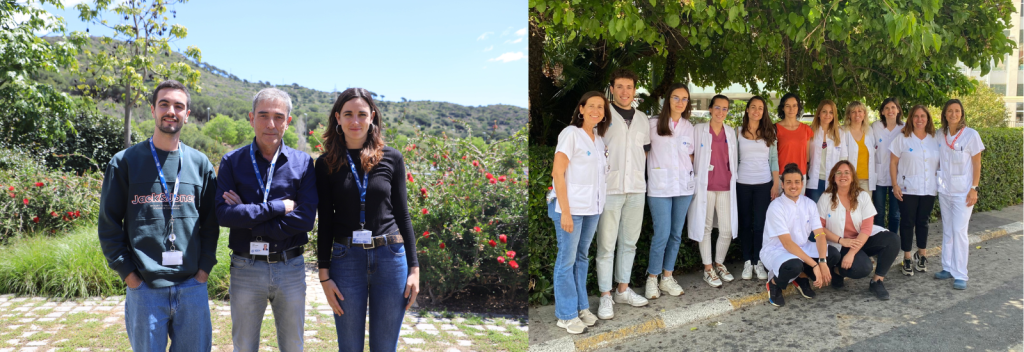Researchers at the Pere Virgili Institute for Health Research (IISPV) and the Germans Trias i Pujol Research Institute (IGTP) have conducted a review of the therapeutic potential of extracellular vesicles in inflammatory bowel disease. Although this approach is in the early stages of research, there are already clinical studies underway for several diseases that support its viability.

20 November 2024, Tarragona. Inflammatory bowel disease is a condition characterised by chronic inflammation in the gastrointestinal tract due to an imbalance in the immune response. It encompasses pathologies such as Crohn’s disease and ulcerative colitis.
Despite therapeutic advances in the last decade, approximately half of all patients still require surgery within the first ten years of diagnosis. Researchers and clinicians are therefore working to develop new treatments that effectively modulate the immune response in inflammatory bowel disease.
A collaboration between the Inflammatory Bowel Diseases Research Group (GReMII) of the IGTP, and the Inflammatory Diseases Research Group (IBODI) of the Institut d’Investigació Sanitària Pere Virgili (IISPV), the Rovira i Virgili University (URV) and the Centre for Biomedical Research Network on Liver and Digestive Diseases (CIBEREHD) has resulted in a comprehensive review of the potential of mesenchymal stem cell-derived extracellular vesicles (MSC-EVs) as a potential innovative therapy to treat these pathologies. The results of this work have been published in Clinical and Translational Medicine, one of the leading journals in translational medicine.
Dr. Josep Manyé, co-author and IGTP and CIBEREHD researcher, highlights that ‘MSC-EVs represent a promising therapeutic alternative for inflammatory bowel disease, as they can offer significant benefits over conventional cell therapies. As an acellular therapy, MSC-EVs present lower risks of immunogenicity and tumourigenicity, as well as being easier to store and handle.
The review takes an in-depth look at the immunomodulatory, pro-regenerative, anti-apoptotic and anti-fibrotic properties of MSC-EVs in preclinical studies. Dr Carolina Serena, senior researcher at the IISPV and co-author of the study, adds: ‘We have analysed in depth the current knowledge on the functions of MSC-EVs in chronic inflammatory processes using advanced transcriptomic, proteomic and lipidomic techniques, which have allowed us to identify their mechanisms of action and understand how they can restore intestinal haemostasis’.
In addition, the article discusses advances in the characterisation of MSC-EVs, isolation methods and the challenges that must be overcome to translate this innovative therapy to the clinical setting. Dr. Laura Clua-Ferré, first author of the publication and researcher at the IGTP, highlights that ‘the results of this review provide a solid basis for the further development of innovative therapies for inflammatory bowel disease, and reflect the commitment of our research teams to offer safer and more effective alternatives to patients’.
The research team concludes that MSC-EVs have the potential to transform the therapeutic approach to inflammatory bowel disease by addressing a potential new pathway to effectively treat chronic intestinal inflammation, promote tissue repair and contribute to the restoration of intestinal balance. Currently, there are about 20 phase I or II clinical trials investigating these vesicles in different diseases. However, the authors highlight the need to overcome regulatory and logistical challenges before these therapies can reach patients.
Referencia
Clua-Ferré L, Suau R, Vañó-Segarra I, Ginés I, Serena C, Manyé J. Therapeutic potential of mesenchymal stem cell-derived extracellular vesicles: A focus on inflammatory bowel disease. Clin Transl Med. 2024 Nov;14(11):e70075. DOI: 10.1002/ctm2.70075
Funded
The research has been funded by the Ministry of Science and Innovation (reference number PID2021-122636OB-I00) and the Instituto de Salud Carlos III (reference number PI20/00420), with the support of the Centro de Investigación Biomédica en Red (CIBER), through the programmes CB06_04_0034 and RYC2013-13186, as well as co-financing from the European Regional Development Fund (ERDF). In addition, it has been supported by the INVESTIGO-AGAUR programme (reference numbers 100008ID1 and 100036TC2) and the Centro de Investigación Biomédica en Red de Enfermedades Hepáticas y Digestivas (CIBEREHD), with reference number CB06_04_0034.